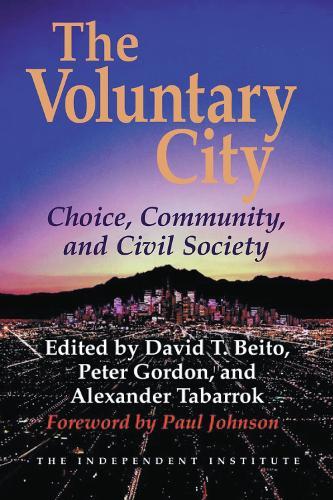Overview
Assembling a rich history and analysis of large-scale, private and voluntary, community-based provision of social services, urban infrastructure, and community governance, this book provides suggestions on how to restore the vitality of city life. Historically, the city was considered a center of commerce, knowledge, and culture, a haven for safety and a place of opportunity. Today, however, cities are widely viewed as centers for crime, homelessness, drug wars, business failure, impoverishment, transit gridlock, illiteracy, pollution, unemployment, and other social ills. In many cities, government increasingly dominates life, consuming vast resources to cater to special-interest groups. This book reveals how the process of providing local public goods through the dynamism of freely competitive, market-based entrepreneurship is unmatched in renewing communities and strengthening the bonds of civil society.
Full Product Details
Author: David T Beito ,
Peter Gordon ,
Alexander Tabarrok ,
Paul Johnson
Publisher: Independent Institute,U.S.
Imprint: Independent Institute,U.S.
Dimensions:
Width: 15.20cm
, Height: 3.30cm
, Length: 22.90cm
Weight: 0.653kg
ISBN: 9781598130324
ISBN 10: 1598130323
Pages: 480
Publication Date: 30 October 2009
Audience:
General/trade
,
General
Format: Paperback
Publisher's Status: No Longer Our Product
Availability: Out of stock

The supplier is temporarily out of stock of this item. It will be ordered for you on backorder and shipped when it becomes available.
Reviews
""The Voluntary City is, in several respects, a big book. It is also an important one. The key question is the optimal mode of provision of a whole range of 'public' services, including housing, transportation, education, medical care, police and law courts. This book may lead to a reconsideration of how these services might be better provided through voluntary, market-based arrangements than by the ministrations of urban planners and other experts of the modern welfare state.""--Nathan Rosenberg, Fairleigh S. Dickinson, Jr. Emeritus Professor of Public Policy, Department of Economics, Stanford University ""The exciting and pioneering book, The Voluntary City, sketches out a provocative vision for communities based on civil cooperation and entrepreneurship. Drawing upon a fascinating history of city innovations, the book shows why the de-bureaucratization of urban life is crucial to fostering thriving markets, vibrant neighbors and educational excellence. A book worth reading.""--Jerry Brown, Governor of California; former Attorney General of California; former Mayor, City of Oakland ""The line between what governments should do and what should be left to private action is central to economics. The Voluntary City bundles 14 essays on entities straddling that line, operating apart from state authorities but undertaking, through coordinated voluntary action, tasks now usually performed by state institutions. The best chapters draw fascinating examples from American, British and European history, depicting grassroots organizations and institutions that provided mutual insurance, turnpikes, urban planning, mediation, and policing.""--Journal of Economic Literature ""This important book, The Voluntary City, tells how civil society was once able, through voluntary associations of like-minded and like-occupied people, to provide public goods that in recent generations have become increasingly subject to governmental initiatives and governmental regulation.""--Harold J. Berman, late Woodruff Professor of Law, Emory University ""This provocative book reexamines the history, contributions, and policy implications of nongovernmental agents in constructing cities and services including housing, health care, police, turnpikes, and education. . . . Many case studies raise interesting questions about the successful vernacular development of neighborhoods and group projects. . . . As we debate urban solutions involving new relations of public and private, as well as competing interests in changing U.S. cities, these essays provide challenging arguments. Recommended.""--Choice
Author Information
David T. Beito is associate professor of history at the University of Alabama. He is the author of Black Maverick: T.R.M. Howard's Fight for Civil Rights and Economic Power, From Mutual Aid to the Welfare State: Fraternal Societies and Social Services, 1890–1967, and Taxpayers in Revolt: Tax Resistance during the Great Depression. He is the author of several scholarly articles and his popular articles have appeared in the Atlanta-Journal Constitution, National Review, Perspectives, and Reason. He lives in Northport, Alabama. Peter Gordon is a professor in the University of California's School of Policy, Planning and Development. He and his colleagues have developed various economic impact models which they apply to the study of the effects of infrastructure investments or disruptions from natural events or terrorist attacks. Recent work involves the modeling and study of economic impacts. He has been published in most of the major urban planning, urban transportation, and urban economics journals. He lives in Los Angeles. Alexander Tabarrok is research director for the Independent Institute, assistant editor of the Independent Review, and associate professor of economics at George Mason University. He is the editor of Changing the Guard: Private Prisons and the Control of Crime and Entrepreneurial Economics: Bright Ideas from the Dismal Science. His papers have appeared in the American Law and Economics Review, the Journal of Law and Economics, the Journal of Health Economics, and the Journal of Theoretical Politics. He lives in Centreville, Virginia.




